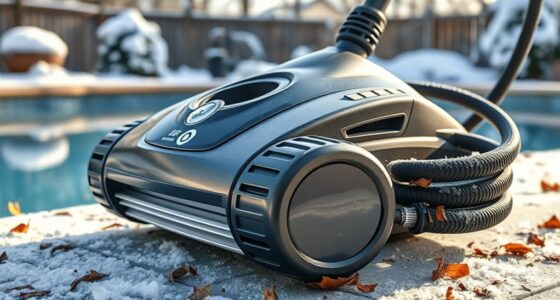Home maintenance doesn't have to be a chore. Start by cleaning your kitchen grates and burners with a warm soapy water and vinegar solution to tackle that stubborn grease. Fix leaky faucets easily by replacing worn washers, and use a plunger for minor clogs. Boost your energy efficiency by sealing gaps around windows with caulk, and swap out incandescent bulbs for LEDs. Lastly, don't forget to clean your gutters regularly to prevent damage. These tips are just the beginning; there are plenty more helpful hacks you can learn to keep your home in top shape.
Key Takeaways
- Seal gaps and cracks around windows and doors with caulk or weather stripping to improve energy efficiency and reduce utility bills.
- Clean gutters every three months to prevent water damage and ensure proper drainage; consider installing gutter guards for less frequent maintenance.
- Replace HVAC air filters every 1-3 months to enhance air quality and improve system efficiency, leading to lower energy costs.
- Regularly wipe down kitchen surfaces and appliances weekly to maintain cleanliness and prevent buildup of grease and grime.
- Use vinegar and baking soda for quick, effective solutions to unclog drains and freshen garbage disposals with lemon peels.
Essential Kitchen Maintenance Tips
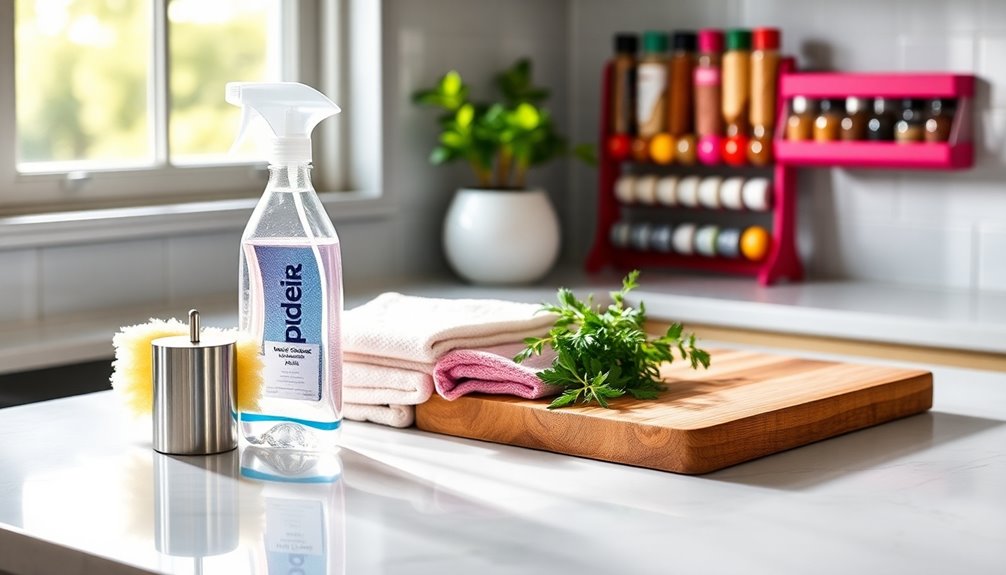
Keeping your kitchen in tip-top shape is essential for both hygiene and efficiency. Start by cleaning your grates and burners; soak them in warm soapy water, scrub, and tackle tough grease with a vinegar solution. Regular cleaning helps reduce allergens and pollutants, improving indoor air quality.
For spinning arms, clear any food debris from the water holes, and don't forget the drainage area—remove debris, sprinkle baking soda, and scrub. Garbage disposal cleaning is also important; drop lemon peels into the disposal and run it to freshen.
Your filter needs attention too; use a brush with baking soda or warm soapy water to keep it clean.
Aim for a weekly wipe down of countertops, sinks, and appliances, while monthly cleaning should include those grates and filters.
With daily quick wipe-downs, you'll maintain a sparkling kitchen effortlessly. Remember, consistency is key!
Quick DIY Repair Solutions
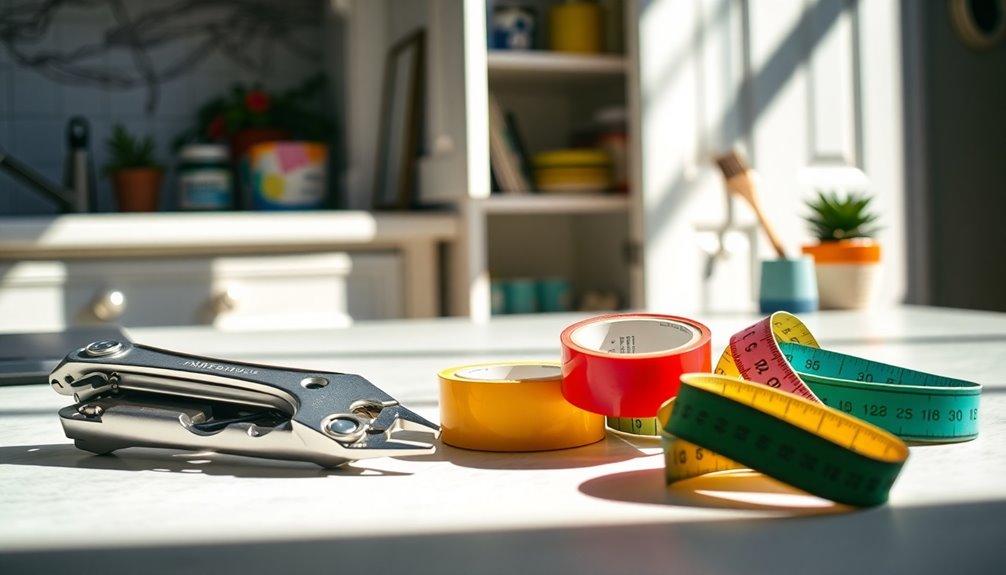
A well-maintained kitchen not only looks good but also functions better, and that's where quick DIY repair solutions come into play.
If you've got a leaky faucet, start by shutting off the water supply, then replace worn washers. Fixing a leaky faucet is a simple DIY task that can save on plumbing costs.
For clogged drains, try using a plunger or a plumber's snake, and a vinegar-baking soda mix can help with minor blockages. Additionally, using advanced filtration systems in your home can help prevent debris buildup in drains.
Patching drywall holes is easy: clean the area, apply filler, sand it smooth, and repaint.
When replacing light switches, turn off the electricity first and carefully reconnect the wires to the new switch.
Finally, don't forget caulking; clean the surface, apply it with a caulk gun, smooth it out, and let it dry for a neat finish.
Energy Efficiency Improvements

When you prioritize energy efficiency improvements in your home, you not only save money on utility bills but also create a more comfortable living environment.
Start by sealing gaps and cracks around floors, walls, and windows with caulk or weather stripping to prevent air leaks. Adding insulation in attics or basements can keep your home cozy year-round and cut energy use by about 10%. Additionally, upgrading insulation in attics and basements can further enhance energy retention and comfort throughout the seasons.
Consider upgrading to energy-efficient doors and windows, which significantly reduce heat loss. Installing programmable thermostats can optimize your heating and cooling based on your schedule.
Lastly, swap out old appliances for ENERGY STAR-certified ones to boost efficiency.
These simple changes create a more sustainable home while enhancing your comfort.
Gutter and HVAC Care
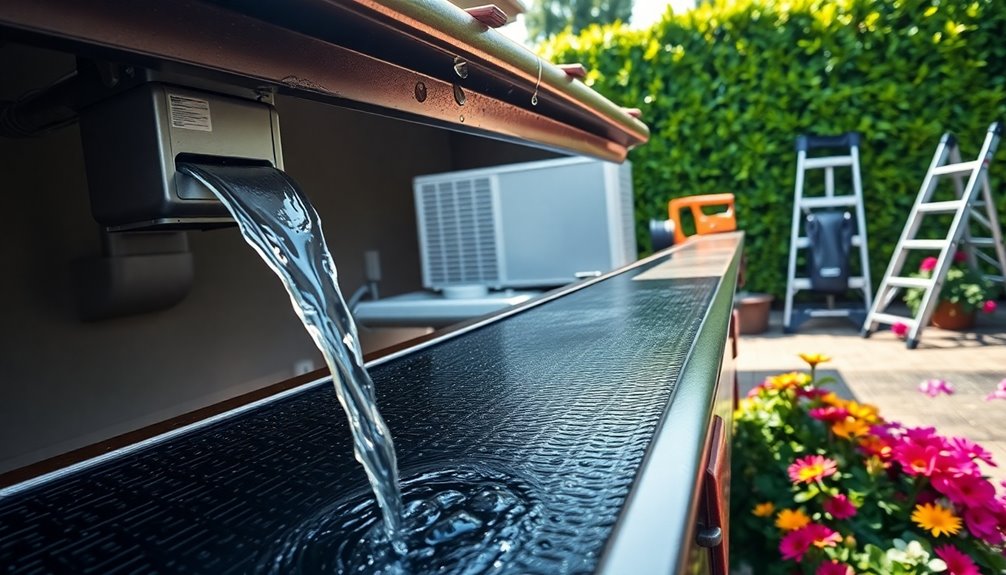
Maintaining your gutters and HVAC system is essential for preventing costly repairs and ensuring a comfortable home.
Clean your gutters every three months to remove leaves and debris, and inspect them for damage twice a year. Installing gutter guards can help reduce cleaning frequency. Ensure downspouts are clear to prevent water backup. Regular inspections can significantly reduce the likelihood of leaks and further damage to your gutters.
For your HVAC, replace air filters every three months to boost performance and lower energy bills. Clear dirt from the outdoor unit and inspect ductwork for leaks.
Before the heating or cooling seasons, perform a system check to ensure everything runs smoothly. Keep vents unobstructed for consistent airflow.
Affordable Maintenance Strategies
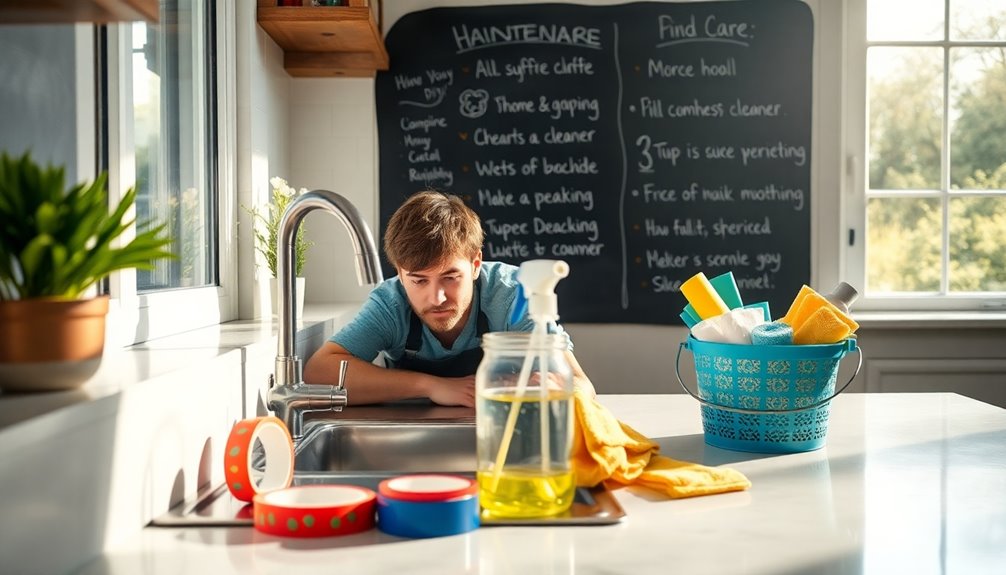
To keep your home in top shape without breaking the bank, it's crucial to adopt affordable maintenance strategies that fit your budget.
Start by establishing a regular cleaning routine; dusting and vacuuming not only enhance aesthetics but also prevent damage. Invest in quality cleaning supplies to extend the life of your surfaces and appliances. Regularly checking HVAC filters and replacing them every 1-3 months can also improve air quality and system efficiency, while utilizing heat pump technology can further enhance energy savings.
Don't forget to seal gaps and cracks around windows and doors with caulk or weatherstripping to improve energy efficiency.
Consider tackling a DIY painting project with discounted paint to boost your home's curb appeal.
Finally, swap out incandescent bulbs for energy-efficient LEDs and utilize smart home technology to automate lighting, ensuring long-term savings on your utility bills.
Frequently Asked Questions
How Often Should I Clean My Kitchen Appliances?
You should clean your kitchen appliances regularly to keep them functioning well.
For your refrigerator, wipe down shelves weekly, deep clean it monthly, and perform a thorough check every few months.
Wipe your stovetop after each use, clean it weekly, and deep clean monthly.
Clean your dishwasher's filter monthly and run a cleaning cycle.
Don't forget your microwave; wipe it after use and do a deep clean monthly to maintain hygiene and efficiency.
What's the Best Way to Unclog a Drain?
When you're dealing with a clogged drain, start by pouring boiling water down it; this can dissolve minor build-ups like soap or grease.
If that doesn't work, try the baking soda and vinegar method for a fizzy reaction that helps break down clogs.
For tougher blockages, a drain snake or plunger can be incredibly effective.
Just remember to clean your tools afterward to prevent future clogs.
How Can I Prevent Mold in My Home?
Preventing mold in your home is crucial, yet it can feel overwhelming.
You can maintain a balance by controlling moisture levels and ensuring proper ventilation. Keep indoor humidity below 60%, and use dehumidifiers if necessary.
Regularly check for leaks and clean high-risk areas like showers and sinks. Don't forget to dry wet surfaces promptly.
When Should I Replace My Smoke Detector Batteries?
You should replace your smoke detector batteries every six months if they're powered by a 9-volt battery.
For lithium batteries, aim to replace them every 3-5 years. It's smart to do a yearly replacement during Daylight Saving Time.
Also, remember to test your detectors monthly to ensure they work properly.
If you hear chirping sounds or see a yellow light, it's time to change those batteries right away!
How Do I Know if My Home Needs Insulation?
To know if your home needs insulation, watch for high energy bills, inconsistent temperatures, or drafts in various rooms.
If you feel cold spots or notice moisture issues, that's a sign too.
Check for icicles forming on your roof; they indicate heat escaping.
You can measure insulation depth or conduct a visual inspection for gaps.
If you're unsure, consider hiring a professional for a thorough energy audit to assess your insulation needs.
Conclusion
By embracing these home maintenance hacks, you're not just keeping your space in tip-top shape; you're also nurturing the heart of your home. A little effort now can save you from larger headaches down the road. Remember, every small task is a step toward creating a cozy sanctuary that reflects your care and attention. So, roll up your sleeves and enjoy the process—your home will thank you for it in countless ways.



